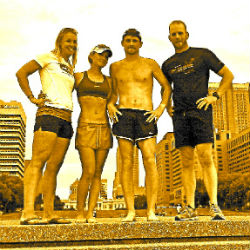Those Who Get It
 When someone gets it… there’s nothing like it.
When someone gets it… there’s nothing like it.
Last week, I ran thirty miles on my 30th birthday. Not as a race. Not in an organized event. I simply ran from Lafayette High School in Wildwood to the St. Louis Arch. For several years I had wanted to ring in the big 3-0 with a thirty-mile run, and last week the big day arrived.
In the grand scheme of things, the run didn’t mean anything. In the course of world history, it didn’t matter if I finished or not. In the milieu of global events, nobody or their mother cared.
But I cared. To me, the run was important. Really important. It was something I wanted to do. It was a personal goal, and I was determined to complete it. After all, as runners, when we set out to do something, we do it. It’s just the way we’re wired.
It’s funny, but when you throw out an idea like running thirty miles—birthday or not—you are inevitably assailed with a smorgasbord of responses, most of which revolve around the question “Why?” There were those who asked why and expressed admiration. There were those who asked why and said I was crazy (in a good way). There were those who asked why and said I was crazy (not in a good way).
And then there were those who didn’t ask why at all. They simply told me where they’d meet up with me along the way.
Goals are personal. Goals make us vulnerable. To set a goal is to expose both your desires and your limits. It is to defy a world of façade and social veneer and put yourself out there without artificiality or pretense. To set a goal is to lay bare a very real version of yourself—a childlike version, even. It is the kid in us who craves adventure. It is the dreamer. The part of us that would make pillowcase capes and jump off couches and pretend to be superheroes—and really believe that we were—that’s the part of us that sets our goals. To run thirty miles or one. To lose weight or earn a degree. To write a book or play music. Yes, our goals are personal because they expose the most honest part of who we are and who we hope to be.
Runners have especial insight to the significance of personal goals. As runners, not only are our goals tangible, but so are the challenges and struggles along the way. There are no posers on the road. There can’t be. The miles don’t allow it. Our distance is our distance. Our pace is our pace. Our physical, mental, and emotional limits are open for all to see. When we run, we are very human.
Because of that, we know what it means to hear a word of encouragement, to see a waving hand, to recognize a smiling face. We know what it means to have a complete stranger call our name in the morass of late miles. We know what it means to see a friend or family member at mile twenty, someone who spent half the morning driving around the city, evading closed streets and barricades and a million spectators just to see us for two seconds. We know what it means to have someone be there—and to know that he or she is there for us.
My “30 on 30” birthday run may have been my goal, but I didn’t achieve it alone. I ran on the strength of family and friends who got it—runners and non-runners alike—whether they ran every step of the thirty miles with me (shout-out to Mr. Speedy Pants!) or simply called out my name in passing; whether they woke up at 4:00am to run the first pre-dawn miles or skipped work to keep us company at the end; whether they drove a support car stocked with Gatorade and met us at designated stops along the way or rerouted their commute to wave and cheer us on in passing; whether they waited under the Arch to celebrate with us when we finished or simply joined us at the post-run feast. In each case, they sacrificed their time and interrupted their day and inconvenienced themselves in all manners just to be there, because they got it.
And it meant the world to me.
Yes, goals are personal. They are a part of who we are. They are a part of who we hope to be. And while achieving a goal is a glorious thing, being surrounded by people who are excited for us, who are there for us, who know how important our goals are to us—is even greater.
To Jake, Emily, Joe, Lindsey, Seth, Alicia, Luke, and Ogi—Thank you from the bottom of my heart.
Amy L. Marxkors is the author of The Lola Papers: Marathons, Misadventures, and How I Became a Serious Runner. Her second book, Powered By Hope: The Teri Griege Story, will be released in 2014.
Connect With Us
see the latest from Fleet Feet St. Louis